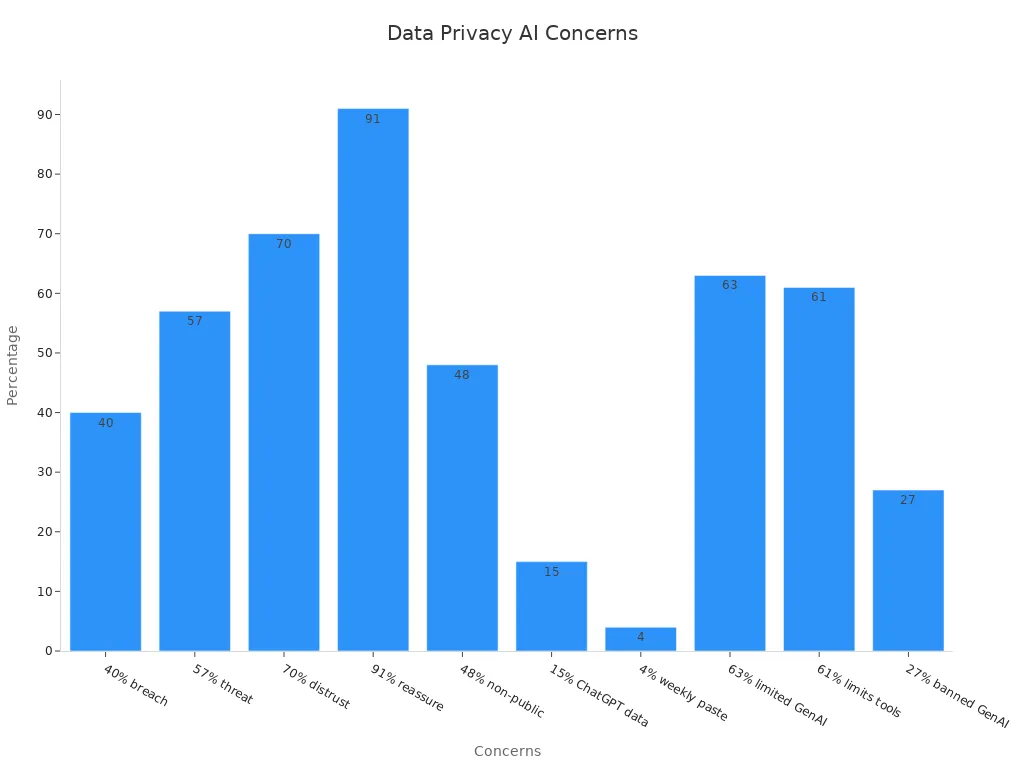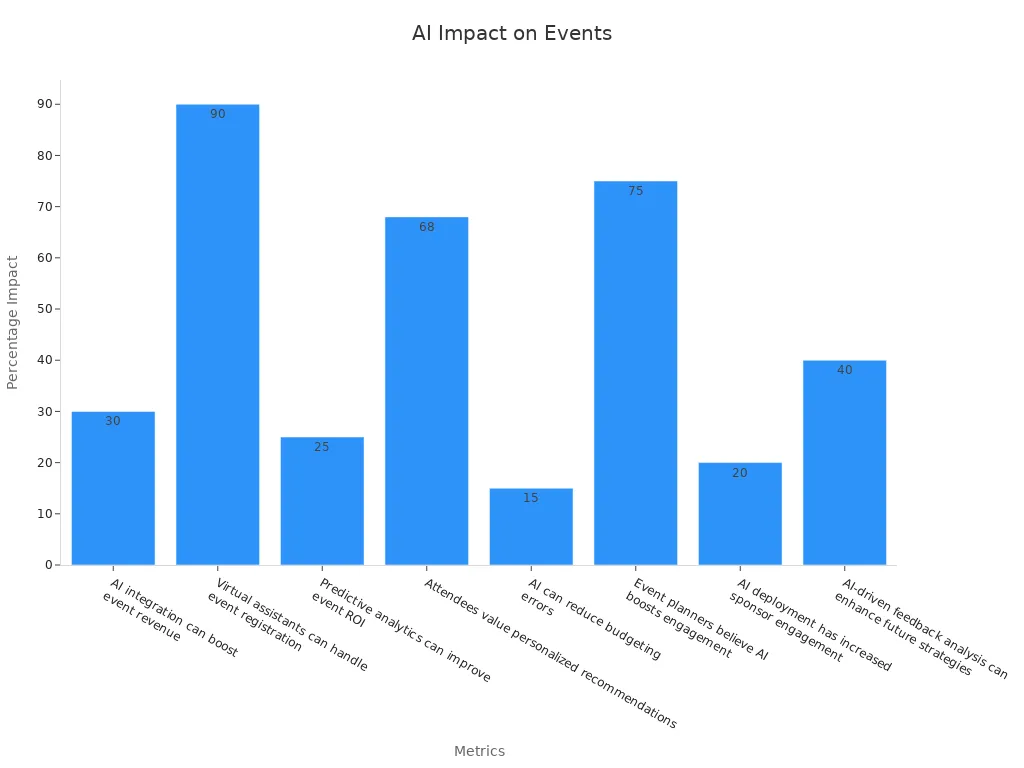Using AI to Share Insights from Events and Conferences

Using AI changes how you share ideas from events. It handles large amounts of data fast, making hard info easy to use. Sharing these ideas helps keep people interested and makes the event successful.
You can check how well your shared ideas work by looking at:
Likes, shares, and comments on social media to see if people like the content.
Website visits and email clicks to show interest in your event.
How many people join sessions and take part in activities.
Surveys and feedback to learn what can be better.
Sharing useful ideas makes people more interested and creates a strong bond with your audience.
Key Takeaways
AI helps events by quickly handling data. This lets teams decide faster.
Tools like transcription and translation make events easier to follow for everyone.
Sentiment analysis shows how people feel, helping improve future events.
AI creates personalized content, making events more fun and meaningful.
Picking the right AI tools for your goals makes planning easier and events better.
Using AI to Improve Event Data Processing
Real-time analysis for live events
Real-time analysis lets you see and react to event changes fast. AI can handle lots of data quickly, helping you make smart choices during events. For example, AI can study how attendees act, check engagement levels, and suggest ways to make the event better.
AI gives useful ideas fast, which helps businesses stay ahead. Studies show 90% of leaders think AI is key to knowing customers. Companies using AI to personalize offers see sales grow by 6-10%. In stores, AI can suggest actions to shoppers in just 200 milliseconds using live data.
Evidence Type | Description |
|---|---|
Business Leader View | 90% of leaders say AI is important for customer understanding. |
Sales Increase | Personalizing offers with AI boosts sales by 6-10%. |
Quick Retail Response | AI suggests actions to shoppers in 200 milliseconds. |
Using AI for real-time analysis makes attendees happier and improves event results.
Automated transcription and translation tools
Transcription and translation tools make talking at events easier. These tools turn speech into text and translate it into different languages. This helps people from all over the world understand the event. AI transcription reduces mistakes and makes sure everyone can follow along easily.
Research shows these tools work well. About 69% of people said live transcription helped them understand tasks. Mistakes dropped a lot when transcripts were used, proving they are reliable. Visual checks showed fewer errors with transcription tools compared to events without them.
69% of people said live transcription helped them understand tasks.
Mistakes were much lower with transcripts, with a t-statistic of -7.40 and a p-value of 1.37 × 10^−5.
Visual checks showed fewer mistakes with transcription tools.
Adding transcription and translation tools makes events welcoming for everyone.
Sentiment analysis to understand audience reactions
Sentiment analysis shows how people feel about your event. AI tools study feedback to find positive or negative feelings and give scores to the text. This helps you learn what people think and fix problems.
Sentiment analysis is great for tracking opinions and improving experiences. It handles lots of feedback well, showing trends and helping you make smart choices. For example, you can use it to see how happy attendees are, find areas to improve, and plan better events.
Evidence Type | Description |
|---|---|
Sentiment Meaning | Sentiment analysis checks feelings in text to show customer thoughts. |
NLP Use | AI tools use natural language processing to study feedback and score text. |
Insight Value | It helps businesses learn customer views and make smart decisions. |
Tracks opinions about brands and products over time.
Helps with research, reputation, and customer experience.
Shows how customers feel about their experiences.
Using AI for sentiment analysis helps you understand audience feelings and improve event plans.
Using AI for Content Creation and Delivery
Making quick summaries of sessions and talks
AI tools can quickly make summaries of event talks. These summaries save time by turning long talks into main ideas. They help share key points with people who missed sessions or need a recap. AI-made summaries are often good and need little fixing. For example, 15% of SmartBook summaries needed no changes. Their BLEU and ROUGE-L scores were 59.0% and 74.1%. Analysts mostly added details instead of removing content. This shows the summaries are useful but may need small edits for more depth.
Using AI keeps your event content easy to share and interesting. Automated summaries let you focus on other tasks like planning or talking with the audience. You can still give attendees helpful information.
Customizing content for different groups
AI helps you match content to what different groups like. By studying user actions, AI guesses what attendees want to see. It then gives them personalized suggestions. This makes people more interested and builds a stronger connection. Personalized content increases clicks and encourages actions. It also builds trust, leading to more success.
For example, AI can study lots of data to make unique experiences for each person. This makes sure your event content fits everyone, no matter their background. Using AI makes your audience feel special and improves their experience.
Turning recorded sessions into marketing materials
AI makes it easy to turn recorded talks into ads. It can do tasks like editing videos, adding captions, and making content for different places. This saves time and money while keeping quality high. For example, a global fast-food chain used AI to speed up video production. This cut production time by 42% and saved 18% of its budget. The company launched ads faster and improved local engagement by 9%.
Other companies like Bayer and Sage Publishing also use AI for marketing. Bayer increased clicks by 85%, and Sage Publishing cut content creation time by 99%. These examples show how AI can improve marketing. It helps you reach more people and get better results.
Implementing AI Tools for Event Insights
Picking the best AI tools for your event
Choosing the right AI tools helps you meet your event goals. Each tool has special features for different needs. For example, language translation tools remove language barriers, making events more welcoming. Personalization tools study what attendees like and create custom experiences. This makes people happier. Tools for customized agendas suggest sessions that match interests, boosting engagement. Data-gathering tools give useful insights to improve future events and increase profits.
AI Tool Feature | Benefit | How It Helps Events |
|---|---|---|
Language Translation | Removes language barriers | Makes events more inclusive |
Personalization | Matches content to preferences | Improves attendee happiness |
Customized Agendas | Suggests fitting sessions | Boosts interest and participation |
Data Gathering | Gives useful insights | Helps plan better and grow profits |
AI tools also make planning easier by saving time on boring tasks. They let you focus on creating fun and meaningful experiences. These tools also collect data to help design events for specific groups. Plus, AI can customize marketing messages, making them more engaging and effective.
Tip: Think about your event goals first. Then, pick AI tools with features that match those goals.
Teaching teams to use AI tools well
Your team needs training to use AI tools the right way. Learning how to use these tools helps them work better. AI can collect feedback through surveys and check feelings with sentiment analysis. It can also test learning with quizzes and find common problems. Tracking how skills are used in real life shows how well training works. Predictive tools can even connect training to results like better work and higher profits.
Level | Description | How AI Helps |
|---|---|---|
1 | Reaction | |
2 | Learning | Tests knowledge with quizzes and simulations. |
3 | Behavior | Tracks how skills are used in real life. |
4 | Results | Links training to better work and profits. |
To get the most from AI, keep learning new things. Encourage your team to try new features and stay updated. This helps them feel confident and use AI tools better.
Note: Hold workshops and practice sessions often. This keeps your team skilled in using AI for events.
Combining AI with current event systems
Adding AI to your event systems makes work smoother and faster. AI works best when it fits with what you already use. For example, linking AI to your sign-up system gives real-time attendee info. This helps you make experiences personal and fix problems quickly. AI can also improve event apps with features like session tips, live polls, and mood tracking.
AI has changed event planning by making data easy to use. Before, finding insights took a lot of time and effort. Now, AI tools give quick answers to simple questions using data. This helps you make smarter choices and run better events.
Tip: Work with your IT team to connect AI tools smoothly. Test everything before the event to avoid tech issues.
Overcoming Challenges in Using AI
Keeping data private and secure
AI tools collect sensitive data, which can cause privacy worries. It's important to protect your event attendees' information. Studies show 40% of companies faced AI-related privacy issues. Also, 57% of people worldwide see AI data collection as a big privacy risk.
Statistic | Source |
|---|---|
Gartner | |
57% of people think AI data collection is risky. | International Association of Privacy Professionals |
70% of US adults don’t trust companies with AI. | Pew Research Center |
To fix this, use strong encryption and check security often. Limit the data AI tools can access to lower risks. For example, 63% of companies now limit data types for AI tools, and 27% have banned them. Be clear about how you use data to build trust with your audience.

Making sure AI insights are correct
AI insights depend on the quality of the data used. To keep them accurate, check if your data is complete and fair. Have your team review AI results to catch mistakes. Train your staff to understand and check AI insights carefully.
For example, teaching your team these skills helps them spot errors. This improves decisions and reduces mistakes. Regularly checking AI tools also keeps their accuracy high.
Managing costs and using resources wisely
AI can be costly, but planning helps control expenses. Start by finding areas where AI saves time or reduces work. For instance, GlobalTech Solutions cut IT problem-solving time by 40%, saving $15 million yearly. Itaú Unibanco saved $15 million by reducing false fraud alerts by 60%.
Company/Case Study | Key Outcomes |
|---|---|
GlobalTech Solutions | Saved $15M yearly by cutting IT problem-solving time by 40%. |
Itaú Unibanco | Saved $15M yearly by reducing false fraud alerts by 60%. |
M-KOPA Solar | Saved $2M yearly by cutting IT support visits by 70%. |
Use flexible AI tools that grow with your needs to avoid overspending. By planning well, you can get the most from AI without going over budget.
The Future of Using AI in Event Insights Sharing

New trends in AI for events and conferences
AI is changing how events are planned and enjoyed. AI-powered tools make events smoother and more enjoyable for attendees. For example, Eventico Technologies raised satisfaction scores by 20% and cut costs by 30% using AI. ConferLink also improved networking by 50% with custom agendas and live data. These examples show how AI makes events better and saves money.
Other companies like Hopin and Cvent use AI for smart streaming and matchmaking. These tools help people connect and have a better time at events. CineMatch reduced schedule problems by 30% and raised satisfaction by 40% with personalized plans. These trends prove AI is not just helpful but a game-changer for events.
Statistic | Source |
|---|---|
Knowland (2024) | |
61% of event tech companies use at least one AI feature. | Skift (2023) |
40% of event tech companies use AI for better connections. | Skift (2023) |
Generative AI could add $2.6 to $4.4 trillion yearly to the economy. | McKinsey & Company (2023) |
How AI boosts teamwork and engagement
AI tools make teamwork and engagement at events easier. They help teams communicate better, even if they are far apart. For instance, SuperNormal turns meeting talks into text and summaries. This keeps everyone updated, even if they miss the meeting.
AI also creates fun and unique experiences. InspireSolutions used AI to write custom song lyrics for visitors. These songs were performed live, drawing more people to their booth. Tools like this make events more exciting and help people connect better.

What AI could do for the event industry
AI will change the event industry in big ways soon. Experts think AI could increase event earnings by 30%. Virtual assistants might handle 90% of sign-ups, and smart data tools could boost profits by 25%. Personalized suggestions, liked by 68% of attendees, may become normal.
Statistic | Impact |
|---|---|
up to 30% | |
Virtual assistants may manage sign-ups | up to 90% |
Smart data tools could improve profits | about 25% |
Attendees like personalized suggestions | 68% |
AI could lower budget mistakes | by 15% |
Planners think AI improves engagement | 75% |
AI has raised sponsor interest | by 20% |
AI feedback tools could improve plans | by up to 40% |
Already, 63% of planners use AI to manage events better, and 90% believe tech is key to success. As AI grows, it will keep improving events, making it a must-have tool for planners.
AI changes how we share ideas from events. It quickly handles data, helping teams act fast on important points. Attendees can focus on talks instead of writing notes. AI tools save details correctly, keeping the meaning clear and avoiding mistakes. Sharing ideas becomes easy, keeping everyone on the same page.
Using AI tools improves event results and adds clear value. Learn about new AI tools to find better ways to manage events. By using AI, you make events smarter and more meaningful for everyone.
FAQ
What AI tools work best for managing events?
AI tools like transcription apps, feedback analyzers, and content customizers are helpful. They handle data, check audience reactions, and create personalized experiences. Pick tools that match your event needs for the best results.
How does AI make attendees more engaged?
AI customizes content and suggests sessions based on attendee interests. It also allows live polls, chatbots, and mood tracking for real-time interaction. These features make attendees feel important and involved.
Is it hard to add AI to current systems?
Most AI tools today easily connect with event platforms. You can link them to sign-up systems, apps, or marketing tools. Work with your IT team to set them up and test before the event.
How can I keep data safe when using AI?
Choose AI tools with strong security and limit their data access. Check your systems often and follow privacy rules. Let attendees know how their data is used to build trust.
Can AI help lower event costs?
Yes, AI saves time by automating tasks like data review and content creation. It also improves marketing and decision-making, cutting expenses. Many companies save money after using AI for events.
See Also
Transforming Blogging: The Impact of AI Blog Creators
AI Blog Creator: Content Development, Hosting, and SEO
Enhancing Audience Interaction Using TikTok Analytics Tools
Writesonic AI and QuickCreator: A Content Creation Showdown
Achieving SEO Excellence with Perplexity AI: An In-Depth Guide

